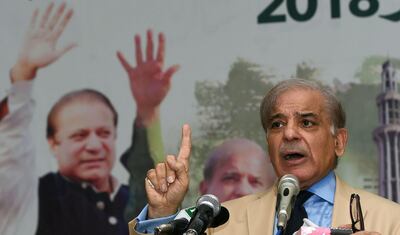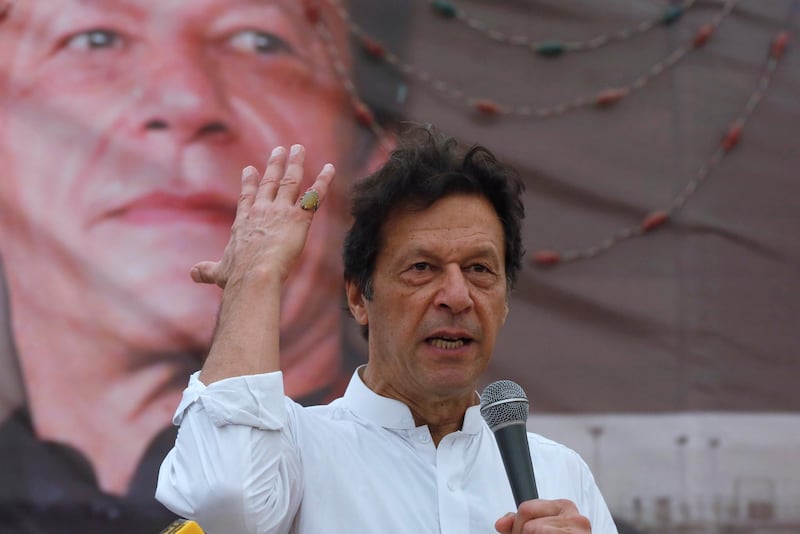As Imran Khan addressed supporters after Nawaz Sharif's conviction on corruption charges, he claimed the verdict heralded "a new Pakistan".
The cricket-star-turned politician had called for an investigation into Mr Sharif – later ousted as prime minister – from the moment the 2016 Panama Papers leak raised questions over the ruling family's property portfolio.
With little more than a fortnight until Pakistan's general election, Mr Khan, who since formally entering politics in 1996 has campaigned against corruption, appears to be closing in on office.
The sentences, delivered in absentia, against Mr Sharif and his daughter and political heir, Maryam, have effectively decapitated their Pakistan Muslim League-Nawaz (PML-N) party.
And though the pair have vowed to return this week from London to appeal their convictions, Mr Khan and his Pakistan Tehreek-i-Insaf (PTI) party believe the verdicts will add momentum to their anti-graft platform.
"The difference now is that I speak to a public that understands issues like corruption and how it impacts their lives," Mr Khan said over the weekend.
"They now understand the correlation between corruption and poverty, unemployment and inflation."
Sentences of 10 years imprisonment for Sharif and seven for his daughter are expected to dominate the remaining stages of an election viewed as a difficult test of the country's democracy.
They watched the verdict on television from the British capital, where the former premier is attending his sick wife.
___________
After Sharif's sentencing, Imran Khan stands on the threshold of history
___________
The July 25 poll marks Pakistan's only second ever democratic transition and comes as the powerful military is widely accused of trying to influence the result and undermine civilian primacy.
Mr Sharif says the case against him was part of wider machinations by the security establishment to weaken the PML-N and replace it with a more pliable PTI. Media criticising the military or favouring the PML-N say they have faced intimidation.
Were Mr Khan's party to win it would be a long-awaited breakthrough. His electoral surge comes after two decades of struggling to overcome what he calls Pakistan's corrupt ruling elite.
For years his vows to bring a "political tsunami" fell short and he has been accused of vague policies and a number of u-turns while forming a populist platform, often capitalising on anti-American sentiment.
But commentators say his political stock has risen as his ties with the army have got closer.
The military, in turn, denies meddling and says it supports democracy.
The conviction of Mr Sharif – removed from office by Pakistan's Supreme Court last July – was widely predicted.
"What's not clear is how much the verdict was already 'priced in' to the election before it was handed down," said one Western official.
"But Imran Khan is definitely the main beneficiary."
Polling released last week showed Mr Khan was already gaining momentum before Sharif was convicted for failing to declare four London flats or the money used to buy them.

One survey by Pulse Consultant put the PTI ahead with the support of 30 percent of respondents nationwide, compared to 27 percent for the PML-N. Another poll by Gallup Pakistan had PML-N on top with 26 percent and PTI with 25 percent.
"Definitely Imran Khan is the main beneficiary of the verdict," said Jan Achakzai, a TV political commentator.
He added: "Every perception that the PML-N is in trouble feeds him."
Yet the PML-N remains a formidable force, particularly in its heartland of Punjab, the country's wealthiest and most populous province. Mr Sharif is disqualified for running in the elections himself, but he is still a political giant potentially able to mobilise a large following for the party now run by his younger brother, Shahbaz.
__________
Read more:
In targeting the media, Pakistan's military weighs in on election
Pakistani politicians' asset declarations reveal deep pockets
__________
A senior PML-N figure said the party hoped voters would view the convictions as so politically motivated that it would not affect the election.
The source said: "The verdict would have had an effect if there had been any legitimacy in the process. But it was just finding some way to support PTI and paint PML black and they have overdone it. This is just coming as another incident in a wave of victimisation."
Some form of hung parliament leading to a coalition is becoming the most likely option, analysts say, most likely involving the third-placed Pakistan People's Party of Bilawal Bhutto-Zardari, son of the assassinated two-time prime minister Benazir Bhutto.
And Mr Khan has not had it all his own way so far, facing internal party criticism for adopting so-called "electables" into his campaign – political elites defected from other parties who bring with them campaign apparatus and guaranteed votes.
His critics say longterm PTI figures have been overlooked in favour of those recent co-optees.
Mr Khan, however, said in an interview last week that the strategy was a pragmatic acceptance of Pakistani politics.
"You contest elections to win," he told Dawn newspaper. "You don't contest elections to be a good boy. I want to win. I am fighting elections in Pakistan, not Europe. I can't import European politicians."





